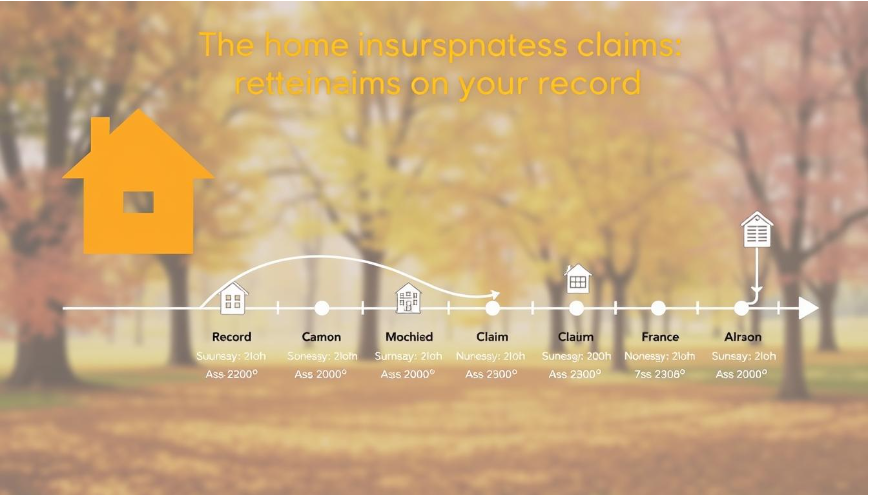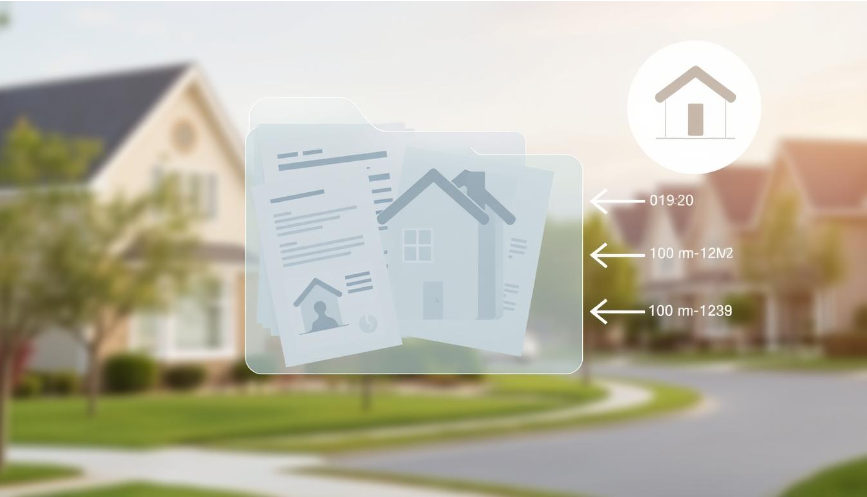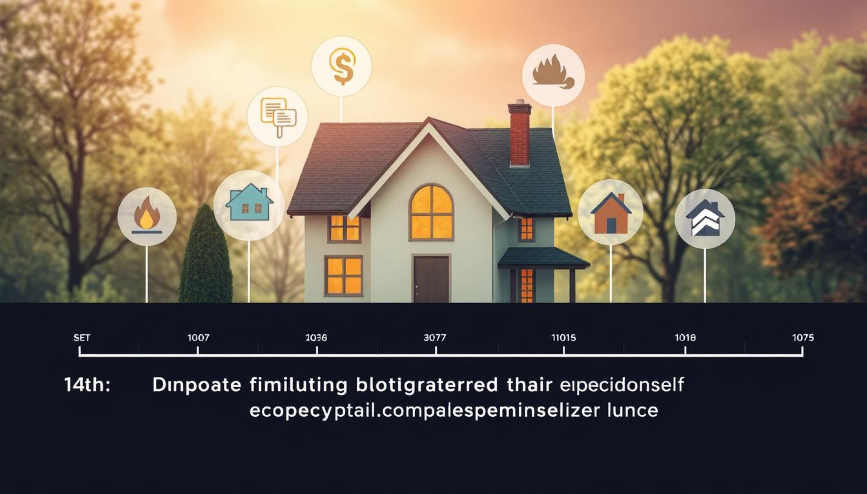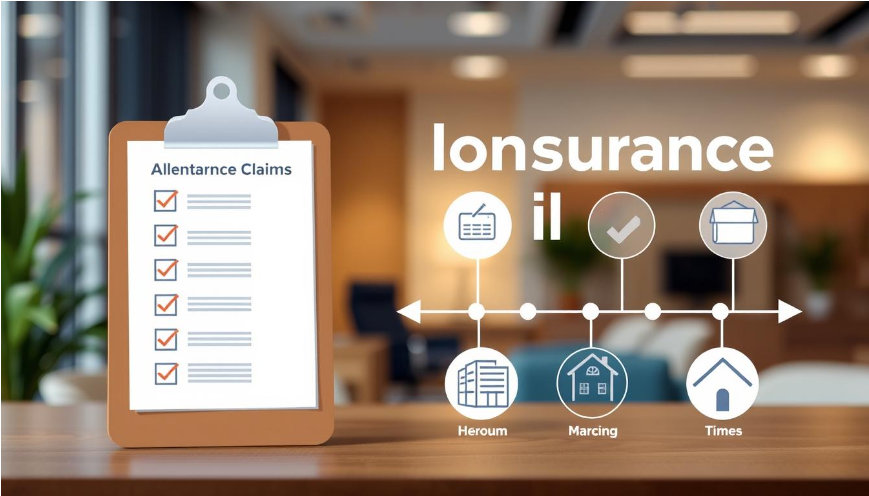Ever thought about how long do home insurance claims stay on your record? And how they might affect your future policy rates? It’s key to know the home insurance claims duration and its effects. We’ll explore how long a claim stays visible, from filing to disappearing from your record. The claims record impact is big, shaping your choices on future claims and new policies.
A visual representation of a timeline illustrating the duration home insurance claims remain on a record, featuring a house icon, various claim icons along a flowing timeline with marked intervals, and a background of changing seasons to symbolize the passage of time.
Understanding Home Insurance Claims
Home insurance claims are key for homeowners. They offer a safety net against unexpected events. Knowing how these claims work helps homeowners use their policies wisely. This section explains what home insurance claims are and why homeowners might file them.
What Are Home Insurance Claims?
Home insurance claims are when policyholders ask for money for damages or losses. These can happen from natural disasters, theft, or accidents. Knowing about claims helps homeowners understand their rights and duties with their policies.
Why Do Homeowners File Claims?
Homeowners file claims for many reasons. The main reason is when big incidents happen that cost a lot to fix or replace. Some common reasons include:
- Damage caused by fire or water
- Theft of personal property
- Destruction from natural disasters like hurricanes or earthquakes
- Liability claims from injuries on the property
Knowing why homeowners file claims helps them get help when they need it. It ensures they get the support they need to recover.
A serene home setting with a cozy living room, showing visual representations of different home insurance claims, like fire damage, water damage, and theft, illustrated as transparent overlays on the walls and furniture. Include a concerned homeowner looking through documents, with a background featuring a calendar marking the passage of time, signifying the duration of claims on record. The overall atmosphere should convey understanding and clarity about home insurance claims processes.
How Long Do Home Insurance Claims Stay on Your Record

The time claims stay visible on your record varies by state and insurance company. It’s key for homeowners to know about claim visibility and duration. This section explains the usual time frames and what affects claim recording.
The Typical Duration of Claim Visibility
Claims usually stay on your record for three to five years. This time can change based on state laws and insurance company policies. Claims for natural disasters might be recorded longer than theft or liability claims. Knowing this can impact your future insurance costs and eligibility.
Factors Affecting Claim Retention Time
Several important factors affect how long claims are kept on record:
- Type of Claim: Some claims, like major damage, are kept longer than minor ones.
- Amount Paid: Insurance companies keep claims with higher payouts on records longer. This is because they see more risk.
- Insurance Provider Policies: Each insurer has its own rules for keeping claim records. Knowing these can help homeowners prepare.
A visual representation of a home insurance claim record, featuring a transparent folder filled with documents and images representing various claims. Include elements like a house icon, timestamps, and arrows indicating the duration of claim visibility, all set against a soft background of a suburban neighborhood. Use calming colors to evoke a sense of security and clarity.
| Type of Claim | Typical Claim Duration |
|---|---|
| Natural Disaster | 3-5 years |
| Theft | 3 years |
| Liability | 3-5 years |
| Property Damage | 3-5 years |
Understanding these factors helps homeowners make better insurance choices. Knowing how long claims stay on record helps manage insurance policies well.
Insurance Claim Duration Explained
Understanding home insurance claims can help you know their effects on your record. Different types of claims can change how long they stay on your record. This part explains the types of claims, their effects, and how long they are reported.
Types of Claims and Their Impact on Records
Homeowners can file many types of claims. These claims can affect your record differently. Here are some common ones:
- Property Damage Claims: These are often due to natural disasters, theft, or vandalism. They usually stay on records longer.
- Liability Claims: These happen when you’re responsible for injury or damage to someone else. They can make your record look worse and might raise your future premiums.
- Personal Property Loss Claims: This is about losing or having your personal items stolen. It usually has a moderate effect on your record.
Claims that result in big payouts, especially liability claims, can stay on your record longer. This can affect your chances for future insurance.
Claim Reporting Timeframes
Insurers have rules for when you can file a claim. Usually, you have a few months after the incident to report it. Each company has its own rules, which can also affect how long claims stay on your record. It’s important to report claims on time to lessen their impact on your insurance record.

A visual representation of a home insurance claims record, featuring a stylized clipboard filled with documents and checkmarks, with a timeline overlay showing the passage of time, surrounded by icons symbolizing different types of insurance claims, all set in a modern office environment with soft lighting.
Home Insurance Claim History and Its Importance
A homeowner’s claim history greatly affects future insurance rates. Insurance companies look at past claims to figure out the risk. If you have many claims, you might be seen as high-risk, leading to higher premiums.
How Claim History Affects Future Insurance Rates
Insurance companies use past claims to set premiums. If you’ve had many claims, they might see you as a higher risk. This can lead to higher rates. Keeping your claim history clean is key to getting better rates in the future.
Significance of Maintaining a Clean Claim Record
Having a clean claim record is vital for saving on insurance costs. A record without many claims builds trust with insurers. This trust can help you get better rates and more options for coverage.
Protecting your property and reducing risks helps keep your claim history clean. This can lead to lower future expenses.
A visual representation of a house surrounded by various symbols of home insurance claims, such as weather icons (flood, fire, wind), with a timeline overlay showing the passage of time, illustrating the impact of claims on property value and insurance premiums, set against a backdrop of changing seasons to signify duration and change.
Understanding the Insurance Claim Reporting Period
The insurance claim reporting period is key for homeowners to know when filing claims. Insurers have a big role in how claims are handled and seen in the future. After a claim is filed, insurance companies put this info in a big database.
This database helps other insurers see a claim history. It can change how future policies and premiums are set.
The Role of Insurance Companies in Reporting Claims
Insurance companies keep detailed records of all claims. They do more than just keep records. They report incidents to agencies, giving a full picture of claim histories.
This helps spot patterns that affect risk assessments. Knowing this can help homeowners manage their claims better.
How Reports Are Accessed by Other Insurers
When looking for new insurance, other companies check past claims in the database. Claims access is key in figuring out risk levels for new policies. This affects not just if you can get coverage but also the cost.
Homeowners should know that every claim can affect future insurance chances. Knowing about the insurance claim reporting period is very important.
Impact of Insurance Claims on Your Record

Insurance claims can greatly affect a homeowner’s record and future policies. It’s important to understand how claims impact your finances. A clean record can lead to lower premiums, showing less risk for insurers.
On the other hand, multiple claims may suggest a higher risk. This can result in higher premiums for homeowners.
How Claims Influence Future Policies and Premiums
Claims can significantly shape future policies. Insurers look at your claims history to set premiums and coverage. A clean record usually means better terms and lower rates.
Homeowners should think about the long-term effects of filing claims. Even small incidents might not be worth a claim.
Comparing Claims-Free vs. Claims-History Records
Looking at claims-free and claims-history records shows big differences. Homeowners without claims have many benefits for policy renewals and negotiations. Here’s a table comparing these two records:
| Aspect | Claims-Free Record | Claims-History Record |
|---|---|---|
| Premium Rates | Generally lower and more competitive | Often higher due to perceived risk |
| Availability of Coverage | Wider range of options available | Limited choices, may face exclusions |
| Negotiation Power | Strong bargaining position | Weaker, less leverage with insurers |
| Future Policy Considerations | More favorable evaluation for new policies | May complicate obtaining new coverage |
Home Insurance Claim Retention Policies
Homeowners need to know that insurance companies have different rules for keeping claim records. These rules affect how long claims stay on your record. It’s important to know about retention periods to understand how past claims might impact your future insurance choices.
Different Insurance Providers’ Retention Periods
Insurance companies have different rules for how long they keep claim records. For instance, some might keep records for five years, while others might keep them for seven years or more. The type of claim, company rules, and local laws all play a part in these time frames. Here’s a table to show how different:
| Insurance Provider | Claim Type | Retention Period |
|---|---|---|
| State Farm | Theft | 5 years |
| Allstate | Water Damage | 7 years |
| Farmers | Fire Damage | 6 years |
| GEICO | General Liability | 5 years |
Why Retention Policies Vary by Insurer
Insurance companies have different rules for keeping claim records for many reasons. They might adjust their rules based on risk, local laws, and how they handle claims. Knowing these rules helps homeowners manage their insurance history better.
Assessing the Home Insurance Claim Visibility Timeframe
Knowing the claim visibility timeframe is key for homeowners. It’s important to understand what’s in your claim history. This includes details like claim amounts, dates, and types of claims.
Being informed about your claim history helps manage your insurance record. It also helps plan for future coverages.
What Content is Shared in Your Claim History
Your claim history affects how insurers see your risk. It shows all claims made in a certain time, impacting your policy eligibility and premiums. Insurers use this history to guess your future claims.
It’s crucial to grasp the impact of this timeframe on your insurance.
Understanding the Accessibility of Claim Information
Knowing who sees your claim info is also important. Insurance companies share claim details in databases. Other insurers can see this when you apply for new policies.
This knowledge prepares you for insurance quotes. It also shows why keeping a clean claim record is key for better rates later.
FAQ
How long do home insurance claims stay on your record?
Home insurance claims usually stay on your record for three to five years. This time can change based on your state’s laws and your insurance company’s rules.
What impact do home insurance claims have on my record?
Claims can change how insurance companies see you. If you have many claims, you might be seen as a higher risk. This could make your insurance more expensive.
What determines the retention period for insurance claims?
Several things can affect how long claims stay on your record. These include the type of claim, the amount paid out, and your insurance company’s policies.
Can I access my home insurance claim history?
Yes, you can see your claim history. It shows the amounts, dates, and types of claims. Knowing this helps you manage your insurance better.
How do different types of insurance claims affect record duration?
Claims have different effects on how long they stay on your record. Claims that result in big payouts or are reported often might stay longer than others.
What is the insurance claim reporting period?
The reporting period is how long insurers have to report claims to databases. It’s usually a few months after the claim is made.
Why do retention policies vary among insurers?
Policies can change based on the company, local laws, and claim severity. Knowing these differences helps homeowners understand how claims might affect their history.
How can I maintain a clean claim record?
To keep your record clean, think carefully about filing claims. Only file if the damage is big and you’re covered. Fewer claims can lower your insurance costs over time.



